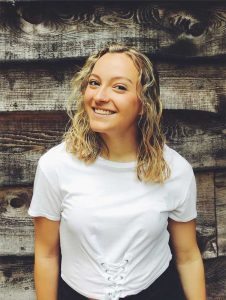
Biology major with a minor in Public Health.
How did you get involved in your current research?
I was interested in infectious disease, so that’s how I found Dr. David Larsen and he put me on a project.
What funding supported your research?
I heard about SOURCE and applied for the grant and got it. SOURCE provides a lot of resources and support.
Who was your research mentor and how did they help you in this process?
Dr. Larsen helped me choose a project. I reached out to him with questions and sometimes I’ll talk to him for longer than we intended because I don’t understand, and he’ll break it down for me. He’s been really supportive in terms of figuring out what I want to study in graduate school.
Why is this research important to you?
My research looks at malaria prevention and intervention. I think it’s really cool research since I’m very interested in infectious disease and health access in developing countries. Biology, public health, and geography are my three areas of interest, and people will wonder how those things even relate to each other. This project shows the relationship.
Approximately how many hours do you spend on research throughout the week?
I spend one to two hours on research and two to three hours in meetings.
What are some things you have learned through this process?
I started on a group project, collaborating with other people. Then, I transitioned to my own independent project. That meant that I had to figure things out on my own and direct questions straight to my research advisor, which he welcomes, thankfully. My research advisor is great, but I think building a student community is really important.
What advice do you have for a student who is looking to get involved in research?
Reaching out to professors is your main way in. It’s a little intimidating, and I feel like that’s why a lot of people don’t do it. The SOURCE Office can be helpful in this process. The biggest thing is identifying your interests. When you meet with a professor definitely read up on his or her research so that you know enough to ask questions about it, which means a lot and it goes a long way.
How do you think the research you conducted will impact your future career?
Research is a rewarding experience. Overall, I have developed some valuable skills. I have learned how to break down complex information for people unfamiliar with my project so I can talk to them about it. I really like doing that.
